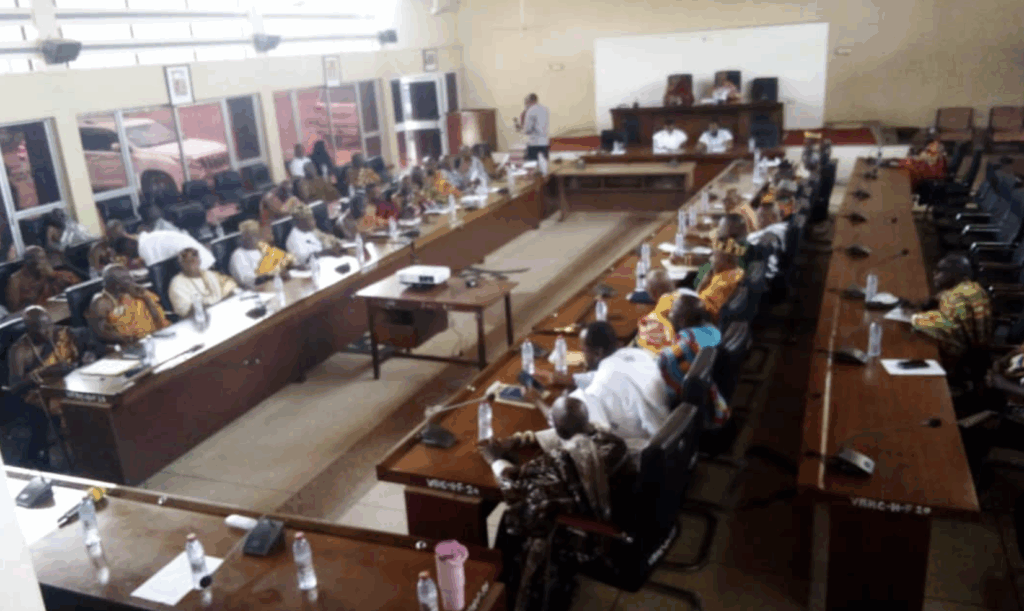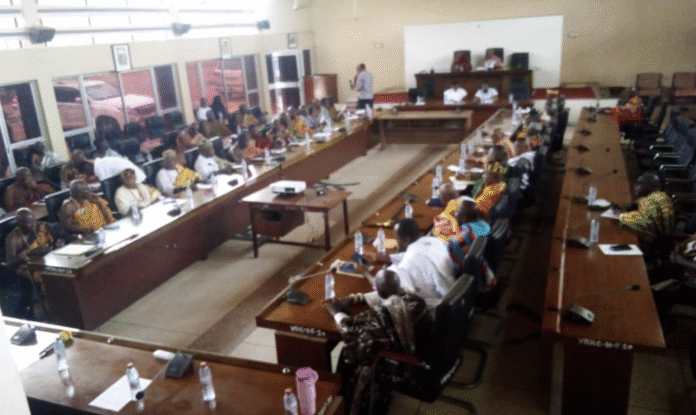
Prof. Jerry S. Y. Kuma, Advisor to the Minister for Lands and Natural Resources, says addressing illegal mining in Ghana demands a coordinated, multi-sectoral and multi-dimensional approach.
Speaking during a stakeholder engagement between the Volta Regional House of Chiefs, the Minerals Commission and the Ministry of Lands and Natural Resources in Ho, Prof. Kuma outlined some interventions the government is rolling out to combat the menace.
He explained that one of the key strategies involves reviewing the laws governing mining licenses to tighten regulatory oversight.
This, he said, would be complemented by stronger enforcement and the management of mining equipment such as excavators.
“We plan to track all excavators across the country. Trackers will be installed so that any unauthorised movement—especially into forest reserves—can be monitored and stopped.
“A national control room has been set up at the Minerals Commission to oversee this system with support from the Ministry of Transport, DVLA, GRA, and the Ghana Ports and Harbours Authority,” Prof. Kuma stated.
He also announced the launch of the Cooperative Mining and Skills Development Programme, approved by Cabinet and expected to be rolled out in the coming week.
This programme aims to formalise the activities of small-scale miners, especially those currently operating illegally, by integrating them into a regulated system.
“Under this initiative, cooperatives made up of chiefs, youth, and women’s groups will be supported to mine responsibly. They will have access to modern processing plants that do not use mercury or cyanide. These plants offer a gold recovery rate of over 90 per cent, compared to 40–60 per cent from the traditional mercury-based methods,” he said.
Prof. Kuma added that this would not only increase yields for miners but also help reduce water pollution.
He said: “The idea is to get more miners using these facilities, where wastewater is treated before discharge. This will reduce the damage to rivers and water bodies.”
He announced that the National Anti-Illegal Mining Task Force would simultaneously step up enforcement to prevent mining in forest reserves.
Togbe Tepre Hodo IV, President of the Volta Regional House of Chiefs, welcomed the initiative but raised concerns about the lingering effects of illegal mining, particularly the use of mercury.
He called for stronger action against offenders, citing reports of birth deformities in communities affected by illegal mining.
“It’s not enough to ban mercury use on paper. There must be strict penalties and enforcement. Otherwise, we’ll continue repeating the same cycle of inaction,” he warned.
Togbe Hodo further urged experts and policymakers to take seriously the lived experiences of traditional leaders and communities and ensure meaningful inclusion in the reform process.
“We must stop the opaque operations in the mining sector. Let’s involve our people, protect our resources, and build a responsible mining future for Ghana,” he added.
DISCLAIMER: The Views, Comments, Opinions, Contributions and Statements made by Readers and Contributors on this platform do not necessarily represent the views or policy of Multimedia Group Limited.
DISCLAIMER: The Views, Comments, Opinions, Contributions and Statements made by Readers and Contributors on this platform do not necessarily represent the views or policy of Multimedia Group Limited.


